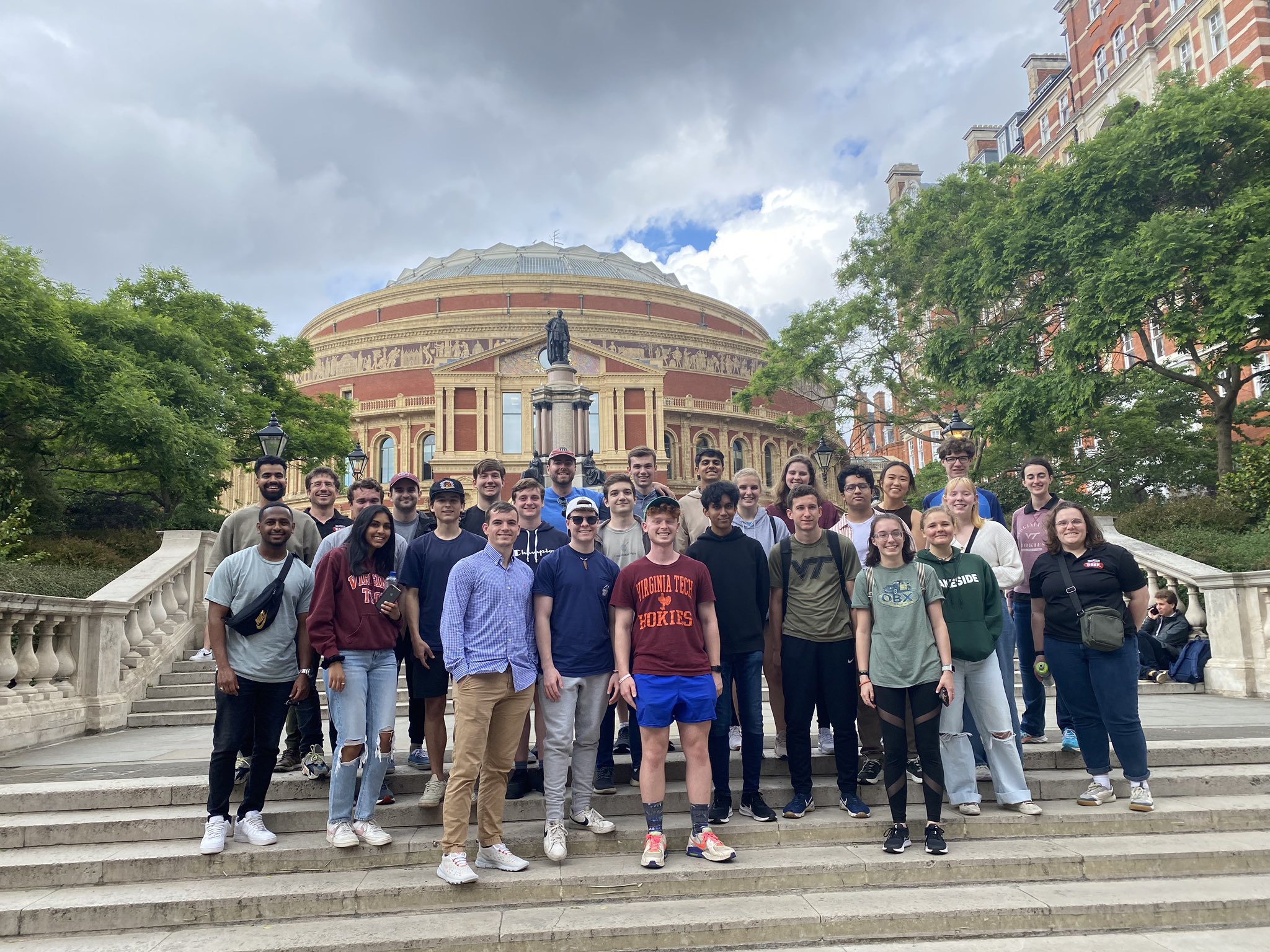Rising Sophomore Abroad Program takes flight once more
After a two-year hiatus, nearly 100 undergraduate engineering students traveled to six countries during the two-week global education experience.

Picture it: Sunsets in Morocco. Afternoon tea in the United Kingdom. Wooly sheep in Ireland. Decadent pasta in Italy. And nearly 100 engineering undergraduates traveling across Europe and North Africa for two weeks.
While not exactly a dream vacation, the award-winning Rising Sophomore Abroad Program (RSAP) is a tour de force of global engineering education and cultural experiences. Since 2014, the Department of Engineering Education (ENGE) has hosted over 800 Hokie engineers through RSAP, the two-week international May experience, and a semester-long course Global STEM Practice: Leadership and Culture.
After a two-year hiatus due to the COVID-19 pandemic, this spring's travel was organized into four tracks: Spain and Morocco, Ireland and the United Kingdom, and two to Italy and Germany, with about 30 or students per track. While RSAP is targeted to first-year engineers, interested students who were unable to travel in 2020 and 2021 were also invited, adding diversity to the groups and creating an opportunity for students to develop mentorship relationships.

Prior to any plane departures, the students explored their track’s destination countries, discussed planning, created poster presentations, and practiced their reflection skills.
RSAP program director and ENGE Assistant Professor Homero Murzi said the course was developed not only to help students prep for travel, but also to reflect on how their track will “impact their development as future engineers."
“The students bring a ‘jump right into problem-solving' mindset from high school,” Murzi said, “so we spend the first few weeks of the semester thinking about the world problems we’re facing as engineers, and how to work with other people to really understand first the scope of the problems we’re trying to solve.”
In addition to track meetings, the course blends thought-provoking activities with lectures from faculty with international experience and global engineers. Through Q&A sessions and one-on-one interviews, students can develop networking and critical-thinking skills in a range of engineering disciplines.
For electrical engineering major Yasser Hassan, a dual resident of Ashburn, Virginia, and Sudan, Africa, the Global STEM course is “by far my most fun class at Virginia Tech.”
For one interactive class, students were divided into three countries: the Starbursts, Milky Way, and Hersheys. Each of the nations had its own rules, traditions, and habits, and even a specific location in the classroom. Then, the students were tasked with figuring out how to collaborate and develop solid business partnerships.

“The course helped a lot in getting rid of our personal biases and be more open to change,” Hassan said. “One thing that really helped was Professor Murzi’s favorite quote, ‘It’s not wrong, it’s just different.’ That was probably the best advice to use in any global aspect.”
The saying emphasizes that differences, regardless of origin, are just that – differences. The future of work requires “global understanding,” said Murzi, so highlighting cultural contrasts and pushing students to explore their potential uncertainty or discomfort is woven into the Global STEM course.
Students also are trained to make meaningful reflections to help them actively engage in the two-week experience, going beyond surface-level insights as they travel the different countries. The RSAP itineraries are packed with tours of engineering companies, such as Harbauer, an environmental technology company in Berlin; visits with students from the local higher education institutions, such as the Center for Cross-Cultural Learning in Rabat, Morocco; and, of course, historical sightseeing to places such as St. Patrick’s Cathedral in Dublin.

Software engineering major Jenny Li said the Global STEM course had already challenged her to examine unconscious biases and pay attention to global problems, especially those not covered by news outlets, but even her class research didn’t teach Li everything she wanted to know. Over a lunch with Center for Cross-Cultural Learning students in Morocco, she experienced Murzi’s favorite saying firsthand.
“Where I learned the most was when we just spent time listing out our differences and similarities,” she said. "The funniest part was the shared pain of being an engineer with sleepless nights and hard courses. Going forward at Virginia Tech, I think I’m encouraged to travel more and see how differences can work together.”
Fellow Spain and Morocco traveler Ameera Hossain, a Bengali American from Northern Virginia, said RSAP was a firm reminder of why she wants to be an engineer. As a rising senior and transfer student, she began the academic year concerned that engineering wasn’t the right path for her.
“I think when I transferred to Virginia Tech, I worried because I couldn’t see any care for people when it comes to STEM,” said Hossain, a computer engineering major focusing in networking and cybersecurity. “Our work is meant to help people and keep their safety in mind while doing so."
Through the Global STEM course and travel experience, Hossain was reminded that even disparate countries with unique problems and solutions share common goals.
“Engineers are meant to be for the people,” Hossain said, “and we can’t grow if we stay stagnant. There's a whole world of people there, and if we stay in our little box, we’ll never get to hear their stories.”
Interested in helping more aspiring Hokie engineers gain critical exposure to global perspectives, cultural differences, and international opportunities in engineering? Consider giving to the Virginia Tech Rising Sophomore Abroad Program crowdfunding campaign.




